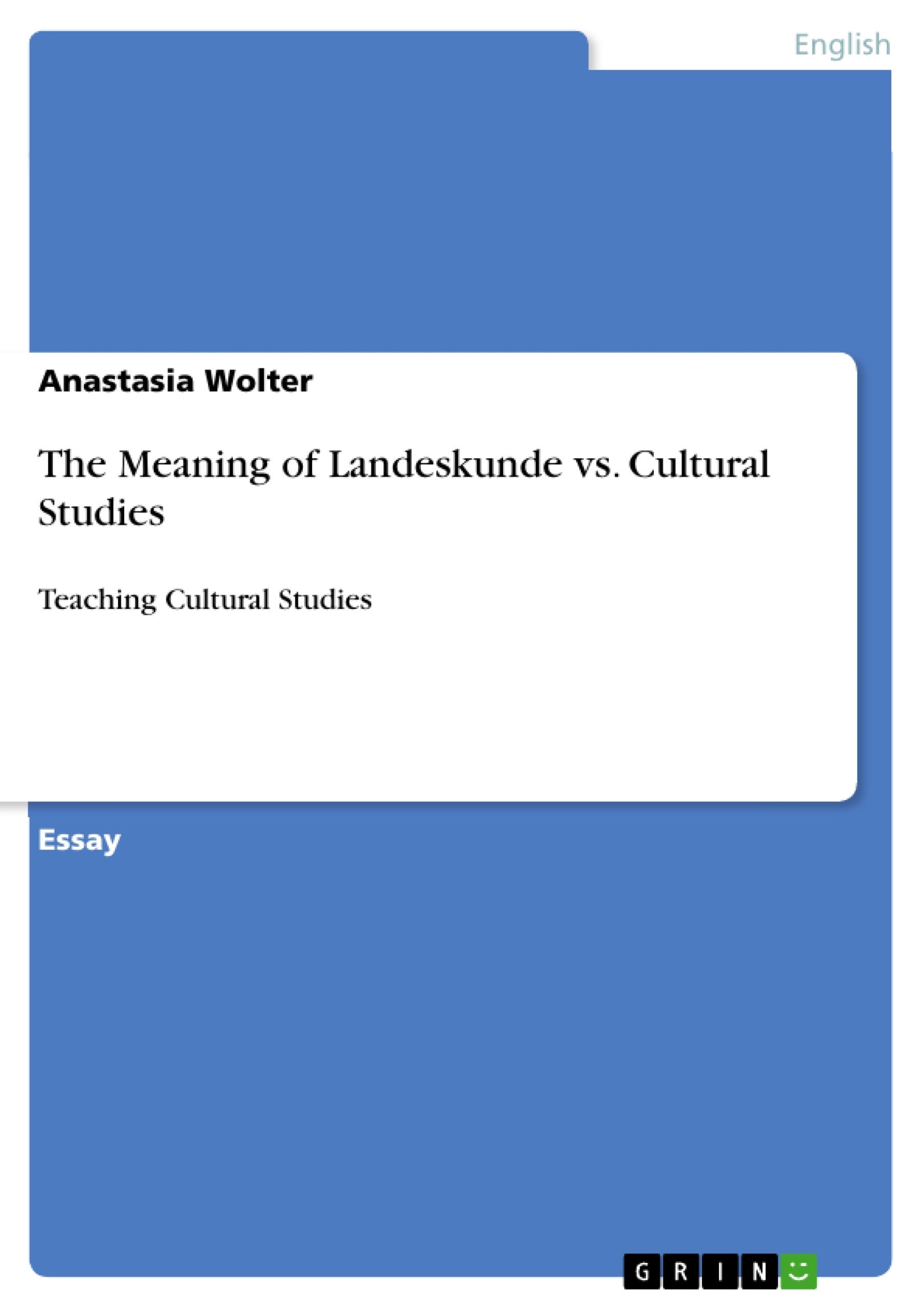This term paper deals with the differentiation between “Landeskunde” and “Cultural Studies”. While Landeskunde is more concerned with the structure of a country and the geographical and political facts, cultural studies also refer to political actions and cultural symbols and interactions.
This topic is very interesting for students and teachers because for many years it was common that Landeskunde was dominating the foreign language lessons. Often students had just to study facts and names while different cultural aspects were disadvantaged. Meanwhile cultural studies are the form, with which students have to deal exploring a different language and its country or culture.
This term paper contains a theoretical part, explaining Landeskunde and cultural studies in general and the difference between them as well as a part with the methodology of teaching these two different approaches to a foreign country and its language. The third part of this paper contains a teaching unit, showing how cultural studies can be taught reasonable and interesting and a conclusion closes the topic in the end.
Table of Contents
- Introduction
- Theoretical Part
- "Landeskunde"
- Cultural Studies
- Cultural Studies and Foreign Language Teaching
- Problems in Teaching Cultural Studies
- Methodology
- Teaching unit
- Teaching Cultural Studies
- Teaching the Culture of Australia
- Conclusion
Objectives and Key Themes
This term paper aims to explore the differences between "Landeskunde" and "Cultural Studies" in the context of foreign language teaching. It examines how these approaches influence cultural understanding and how they can be effectively integrated into language learning.
- The historical development and contemporary relevance of "Landeskunde" and Cultural Studies.
- The challenges and opportunities presented by teaching cultural studies in a foreign language classroom.
- The importance of considering different perspectives and the dynamic nature of culture in teaching cultural studies.
- The role of media and texts in conveying cultural meanings and understanding.
- The relationship between language acquisition and cultural understanding.
Chapter Summaries
The introduction establishes the focus of the paper, highlighting the distinction between "Landeskunde" and "Cultural Studies" and their significance in foreign language teaching. The theoretical part delves into the conceptual framework of each approach, contrasting their focus and methodology. It examines the changing nature of "Landeskunde" and the emergence of cultural studies as a more comprehensive approach to understanding cultures. The paper then explores the challenges and considerations involved in teaching cultural studies, emphasizing the importance of addressing preconceptions and the dynamic nature of culture. The chapter on methodology provides insights into effective strategies for teaching cultural studies, focusing on utilizing a variety of texts and media to foster critical cultural awareness.
Keywords
The key terms and concepts explored in this paper include "Landeskunde," Cultural Studies, foreign language teaching, cultural understanding, media, text analysis, critical cultural awareness, intercultural competence, and dynamic culture.
Frequently Asked Questions
What is the main difference between "Landeskunde" and "Cultural Studies"?
"Landeskunde" focuses primarily on geographical, political, and factual structures of a country, whereas "Cultural Studies" examines cultural symbols, interactions, and the dynamic nature of social meanings.
Why is Cultural Studies preferred in modern language teaching?
It allows students to explore a culture more deeply through critical awareness and intercultural competence, rather than just memorizing names and facts, which was common in traditional Landeskunde.
What are the challenges of teaching cultural studies in a classroom?
Challenges include addressing students' preconceptions, dealing with the dynamic and changing nature of culture, and selecting appropriate media to convey complex meanings.
How does media influence cultural understanding in language learning?
Media and various texts act as vehicles for cultural meaning. Analyzing them helps students develop critical cultural awareness and understand the relationship between language and social context.
What is the role of "critical cultural awareness"?
It refers to the ability to evaluate perspectives, practices, and products in one's own and other cultures critically, which is a key goal of the Cultural Studies approach.
- Citar trabajo
- Anastasia Wolter (Autor), 2011, The Meaning of Landeskunde vs. Cultural Studies, Múnich, GRIN Verlag, https://www.grin.com/document/286755



